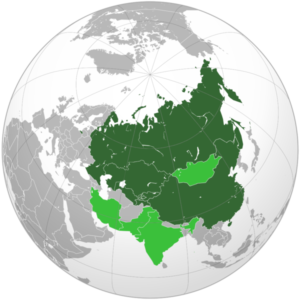
The Shanghai Cooperation Organization (SCO) comprised of Russia, China, Kazakhstan, Kyrgyzstan, Uzbekistan and Tajikistan.
The SCO (Shanghai Cooperation Organization) has grown in prominence during the past several years as a regional counterweight to NATO. Comprised of China, Russia, and 4 of the “Stans” (Kazakhstan, Kyrgyzstan, Uzbekistan, and Tajikistan), the SCO was formed in 1996 with the signing of the Treaty on Deepening Military Trust in Border Regions. The organization is undoubtedly important mainly for its Russian and Chinese membership and the fact that it emphasizes an alliance between Moscow and Beijing. It also is significant because it brings 4 important Central Asian nations into the fold of this alliance, thereby diffusing some of the tension that Russia and China share over the resources of the region. Each year, analysts take note of SCO summit meetings with increased intensity. Recent years have seen SCO summits bring about heightened economic and military cooperation among member states, which makes European nations and NATO none-too comfortable.
Iran has also expressed its open interest in joining the SCO on various occasions. It put in its formal bid for SCO membership in early 2008. Russian Deputy Foreign Minister Alexei Borodavkin on Friday dispelled any of Tehran’s wishes by stating clearly that Iran would not make the cut for the SCO this year. A number of factors play into Iran’s exclusion, including logistical considerations, linguistic barriers (Chinese and Russian are the 2 accepted languages of the alliance), resource sharing, military partnerships and economic cooperation. All this aside, some might consider Russia’s firm words against Iran to be another signal of rapprochement with the US. Last week Moscow denied a shipment of S-300 missiles to Iran, announcing it wanted to wait until Presidents Medvedev and Obama met and discussed the US’ planned eastern European missile defense shield. The US, wary of Tehran’s dominance in the Middle East, does not want to see Iran part of any regional alliance that would give it more power and legitimacy. Russia is well attuned to this and could be using its leverage in the SCO to its advantage.
The SCO summit is in Yekaterinburg, Russia in June, but in the months leading up to the summit, much will be learned about the way resurgent Russia and rising China will use the event to their advantage.
For more, visit Eurasianet.org’s article on Iran’s bid for the SCO.